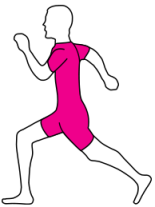
From the WSJ:
However, doctors are less likely to have their own primary care physician—and more apt to abuse prescription drugs.
Lifestyle habits
Exercise: Many physicians say they "embed" it into their lives, making it a non-negotiable part of their daily routine, often early in the morning before demands pile on. One doctor says he gets up at 4:45 a.m. virtually every morning to train for marathons he runs. "But by 8:30 at night, I have the IQ of a zucchini," he says.
Smoking: Only 2% to 4% of physicians smoke cigarettes, compared to roughly 24% of the U.S. population.
Stress: For all their good habits, it's no secret that doctors are under enormous pressure.
References:
What Patients Can Learn from the Ways Physicians Take Care of Themselves. WSJ.
Image source: OpenClipart.org, public domain.






